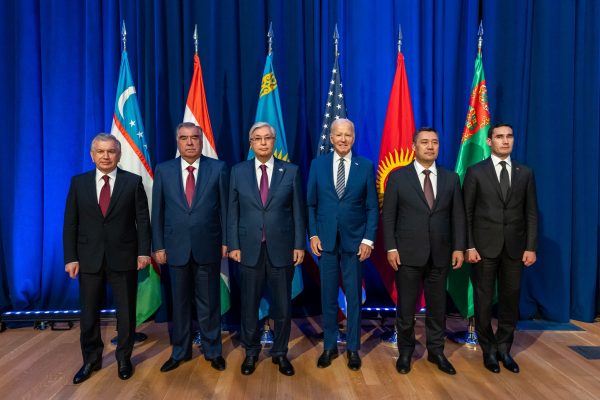CIPE’s work in Central Asia is highlighted in a Joint Statement by the leaders of the C5+1 countries: United States, the Republic of Kazakhstan, the Kyrgyz Republic, the Republic of Tajikistan, Turkmenistan, and the Republic of Uzbekistan. This follows the first-ever C5+1 Presidential Summit, which took place during the 78th session of the United Nations General Assembly in New York City.

In the statement, the leaders affirmed their shared commitment to “sustained cooperation to address the region’s complex challenges and emerging threats.” Topics addressed include enhancing trade and logistical routes, economic resilience, security, and a number of measures to “create a more favorable business environment” for both Central Asian companies and international investors. CIPE’s role will be to coordinate with the U.S. State Department and U.S. Chamber of Commerce to establish a regional business dialogue platform called Business 5+1 (B5+1), which will mirror the work of the C5+1 diplomatic platform and include a number of efforts to strengthen economic ties and attract more international investments. Other stated goals include creating a regional network of young professionals receiving English language and professional development training.
CIPE’s role will be to coordinate with the U.S. State Department and U.S. Chamber of Commerce to establish a regional business dialogue platform called Business 5+1 (B5+1).
The economic partnership commitments mirror the increased political will among the five Central Asian countries to diversify their economies and break down barriers to doing business in the region. Since their independence from the Soviet Union in 1991, the countries’ economies have been largely dependent on the export of raw materials such as oil and natural gas, and large portions of their private sectors have been dominated by semi-state-owned enterprises.

Following severe challenges such as the 2008 recession and 2012 oil price drops, governments have pursued efforts to build economic resilience to external shocks through private sector led growth and open market reforms, also by supporting a healthy middle class- all activities which could facilitate integration into the larger global economy. Progress toward substantial economic reform in Central Asia has been steady, although slow, and many cite an increasing need to better inform policy makers by connecting them with entrepreneurs trying to build their businesses.
Markets fragmentation and barriers to regional trade and investments represent major constraint to growth and regional economic integration in Central Asia. The countries in the region mostly trade with the rest of the world while the share of intra-regional trade is ranging from 10 to 20 percent on average according to national statistics. While the political leadership and government representatives of Central Asia hold regular meetings to consult on strategic issues of bilateral and regional importance, businesses, chambers and associations lack permanent open platform for dialogue on behalf of their members to explore opportunities for regional markets and investments despite this being in a growing demand amid external threats and geopolitical challenges causing regional supply chain and logistical disruptions. Coupled with high-risk business environment, weak regional economic integration also discourages the US and other international investors from expanding their operations in Central. Asia.
A key aim will be to identify barriers to economic growth, regional economic integration, and leveraging long term international investments.
To help address these issues, CIPE proposed a program called “Improving the Business Environment in Central Asia” (IBECA) and funded by the U.S. State Department. IBECA draws on decades of lessons learned by CIPE with private sector partners around the world in their efforts to strengthen the role of private sector associations, adopt innovative approaches to promote inclusive market reforms, encourage global trade, constructive investments and spur new opportunities.
IBECA’s goals include forming working groups both national and regional with chambers of commerce, trade associations, civil society organizations, think tanks, women-led businesses, and small-to-medium-size enterprises in each Central Asian country. A key aim will be to identify barriers to economic growth, regional economic integration, and leveraging long term international investments. Through an inclusive public private dialogue, the working groups will draft economic policy recommendations that will become “National Business Agendas” for presentation to their respective governments. Other work under IBECA involves developing analytical evidence base to inform the dialogue including conducting market analyses, business perception surveys, as well as trainings on advocating for economic reforms and applying for investment opportunities from Europe and the U.S.
…the Forum will provide a unique opportunity for the private sectors of Central Asia to influence economic policy from the bottom up.
CIPE plans to introduce all of the work produced and insights gained during a B5+1 Forum to be held in the future, convening the region’s business leaders, civil society representatives, and government officials to develop a shared regional vision for economic reform, cooperation and investment attraction. The vision is that the Forum will provide a unique opportunity for the private sectors of Central Asia to influence economic policy from the bottom up, and create a more attractive environment for the US and other international investors.
CIPE is an affiliate of the U.S. Chamber of Commerce. The B5+1 model is similar to others created by the Chamber, such as the B7 and B20 private-sector-led business dialogue platforms which aligned with G7 and G20 diplomatic platforms. CIPE’s intent is that the B5+1 Forum will become an annual event that enhances communication among the C5+1 governments and their business communities.
Published Date: September 23, 2023
